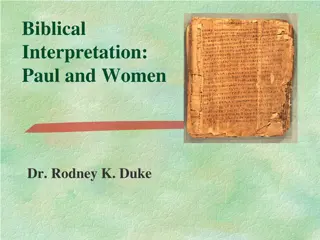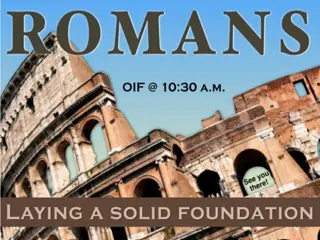Understanding the Epistle of Paul to the Romans at Mountjoy Bible School
Explore the aims and teachings of the class on the Epistle of Paul to the Romans at Mountjoy Bible School. Delve into the historical context, study of the text, and equipping students with tools for Bible study. Discover the significance of Romans among the New Testament epistles and its role in shaping faith and understanding the Scriptures.
Uploaded on Sep 18, 2024 | 0 Views
Download Presentation

Please find below an Image/Link to download the presentation.
The content on the website is provided AS IS for your information and personal use only. It may not be sold, licensed, or shared on other websites without obtaining consent from the author. Download presentation by click this link. If you encounter any issues during the download, it is possible that the publisher has removed the file from their server.
E N D
Presentation Transcript
Spring term 2020 Lesson One Epistle of Paul to the Romans Mountjoy bible school Weymouth class of 2019 Spring term 2020
Class aims review To give confidence in the Bible I aim to give to my students such an intelligent faith in the Old Testament Scriptures that they will never doubt them as long as they live Professor Robert Dick Wilson Ph.D., D.D. To study all the Bible from a panoramic view to a detailed study of the text. To give the necessary tools and training to equip all students to be able to study the Bible for themselves
Class aims review We have possibly completed two of our aims To give confidence in the Bible To study all the Bible from a panoramic view Now we move to a detailed study of the text. And continue to give the necessary tools and training to equip all students to be able to study the Bible for themselves And we can add one other aim; to so equip each student that they, in turn, could teach others
Reminder of the place of Romans The New Testament opens with five books of history The four gospels which are the history of the life of the Lord Jesus, four biographies Then the Acts of the Apostles which is the history of the Apostles and the establishment of the Church. Acts is written by Luke, the only Gentile writer of the New Testament and is written together with his gospel possibly for the defense of Paul
Reminder of the place of Romans There then follows twenty-one epistles written by five Apostles, Paul, James, Peter, John and Jude If we include the epistle to the Hebrews, fourteen were written by the Apostle Paul. The New Testament closes with one book of prophecy, Revelation. Romans is not Paul s first letter, he has already written 1&2 Thessalonians, 1&2 Corinthians and the epistle to the Galatians, but in every manuscript of the New Testament, Romans is first
COLOSSIANS 6 BEATITUDES Truths Of Expectation HOPE 1 THESS. 2 THESS. PHILIPPIANS EPHESIANS BEHAVIOUR Truths Of Expression LOVE TIMOTHY TITUS PHILEMON GALATIANS CORINTHIANS BELIEF ROMANS HEBREWS Essential Truths FAITH Mountjoy bible School
COLOSSIANS 7 1 THESS. 2 THESS. PHILIPPIANS EPHESIANS PROMISES FUTURE TIMOTHY TITUS PHILEMON PRACTICES PRESENT GALATIANS CORINTHIANS PRINCIPLES PAST ROMANS HEBREWS Mountjoy bible School
COLOSSIANS 8 Future Truths TRUTHS FOR YOUR FACE 1 THESS. 2 THESS. PHILIPPIANS EPHESIANS Formative Truths TRUTHS FOR YOUR HEART AND MIND TIMOTHY TITUS PHILEMON GALATIANS CORINTHIANS Fundamental Truths TRUTHS FOR YOUR FEET ROMANS HEBREWS Mountjoy bible School
Reminder of the place of Romans Romans is therefore an exposition of the essential truths of Christianity The things we have to believe to be a Christian These are the principles of salvation by faith The truths expounded in Romans are fundamental truths This simply means that they are the foundation of our faith This is truth for our feet
The approach to the study We have already considered the wise words of Miles Coverdale written nearly four hundred years ago but still a great rule of Bible Study Again, it shall greatly help thee to understand scripture, if thou mark not only what is spoken or written, but of whom, and unto whom, with what words, at what time, where, to what intent, with what circumstance, considering what goeth before, and what followeth after. Miles Coverdale, Preface to the Bible, 1535.
Following the rule of Coverdale We have to begin at the end for our information Some verses from chapter 16 1 I commend to you our sister Phoebe, a servant (deaconess) of the church at Cenchreae, 2 that you may welcome her in the Lord in a way worthy of the saints, and help her in whatever she may need from you, for she has been a patron (prostatis a strong supporter, a succourer) of many and of myself as well. 3 Greet Prisca and Aquila, my fellow workers in Christ Jesus,
Following the rule of Coverdale 4 who risked their necks for my life, to whom not only I give thanks but all the churches of the Gentiles give thanks as well. 5 Greet also the church in their house. Greet my beloved Epaenetus, who was the first convert to Christ in Asia. 6 Greet Mary, who has worked hard for you. 7 Greet Andronicus and Junia, my kinsmen and my fellow prisoners. They are well known to the apostles, and they were in Christ before me.
Following the rule of Coverdale 8 Greet Ampliatus, my beloved in the Lord. 9 Greet Urbanus, our fellow worker in Christ, and my beloved Stachys. 10 Greet Apelles, who is approved in Christ. Greet those who belong to the family of Aristobulus. (great grandson of Herod the Great) 11 Greet my kinsman Herodion. Greet those in the Lord who belong to the family of Narcissus.
Following the rule of Coverdale 12 Greet those workers in the Lord, Tryphaena and Tryphosa. Greet the beloved Persis, who has worked hard in the Lord. 13 Greet Rufus, chosen in the Lord; also his mother, who has been a mother to me as well. 14 Greet Asyncritus, Phlegon, Hermes, Patrobas, Hermas, and the brothers who are with them. 15 Greet Philologus, Julia, Nereus and his sister, and Olympas, and all the saints who are with them.
Following the rule of Coverdale 21 Timothy, my fellow worker, greets you; so do Lucius and Jason and Sosipater, my kinsmen. 22 I Tertius, who wrote this letter, greet you in the Lord. 23 Gaius, who is host to me and to the whole church, greets you. Erastus, the city treasurer, and our brother Quartus, greet you.
Just a note from the list Romans 16:1-16 includes nineteen men and ten women. Yet remarkably, only three of the men are referred to as having a role in the service of the gospel, Of the ten women, seven appear to have been actively involved in the service of the gospel: Phoebe, Priscilla, Junia, Maria, Tryphaena, Tryphosa, and Persis. Of these four, Tryphaena, Tryphosa and Persis are explicitly referred to as working hard in the Lord (cf. Maria, who worked hard among you in v. 6).
Time, Place, and Occasion It is the month of February, in the year of Christ 58. In a room in the house of Gaius, a wealthy Corinthian Christian, Paul the Apostle, having at his side his amanuensis Tertius, addresses himself to write to the converts of the mission at Rome. For himself, the Apostle is about to close his three months' stay at Corinth; he has heard of plots against his life, and he avoids the more direct route from Cenchrea by sea, striking northward for Philippi, and then over the Aegean Sea to Troas.
Time, Place, and Occasion Jerusalem he must visit, if possible before May is over, for he has by him the Greek collections to deliver to the poor converts of Jerusalem. Then, in the vista of his further movements, he sees Rome, and thinks with a certain apprehension yet with longing hope about life and witness there. A Greek Christian woman is about to visit the City, Phoebe, a deaconess of the church at Cenchrea. He must commend her to the Roman church; and a deliberate letter to them is suggested by this personal need.
Time, Place, and Occasion His thoughts have long gravitated to the City of the World. Not many months before, at Ephesus, when he had purposed in the Spirit to visit Jerusalem, he had said, with an emphasis which his biographer remembered, I must (the must of divine compulsion)also see Rome (Acts 19:21); He was assured too, by circumstantial and perhaps by supernatural signs, that he had now no more place in these parts (Rom. 15:23) That is, in the Eastern Roman world where he had worked until now
Time, Place, and Occasion The Lord who in former days had shut Paul up to a track which led him through Asia Minor to the Aegean, and across the Aegean to Europe (Acts 16), Now prepared to guide him, though by ways that Paul could not have anticipated, from Eastern Europe to Western, and before all things to the Eternal City. He would visit Rome but as a Roman prisoner, under armed guard, to appeal his case before Caesar
Time, Place, and Occasion As he thinks of Pheobe and her journey to Rome he also remembers all of those friends and fellow workers which he will list in Chapter 16 They all rise in his mind as he thinks of Phoebe, and her arrival, and the faces and the hands which would welcome her in the Lord Also just as all roads led to Rome, so all roads led from Rome, and there were Christian travellers everywhere (1:8) who could tell him how the Gospel flourished in the Roman church
Time, Place, and Occasion As he heard of them, so he prayed for them, without ceasing (1:9), and made request too for himself, that his way might be opened to visit them at last. But he had other concerns in his heart, quite recently he had to deal with certain teachers in Galatia, who were teaching that in order to be a Christian you had to become a Jew first and keep the Law Some Galatian Christians were abandoning the truth of Justification by Faith only. Had this heresy reached Rome?
Time, Place, and Occasion He also has other concerns; he is writing from Corinth where the church has a problem with Christian practice There was a sense that they thought that now they were Christians they could live as they liked because the Law did not apply to them Also for Paul there is the continual burden of the position of the Jewish people. Why had they not accepted Christ when so many Gentiles are being gloriously saved?
The Outline of the Book The concerns in the heart of the Apostle Paul are seen in the teaching of the letter The subject of the whole letter is clear from chapter 1 16 For I am not ashamed of the gospel, for it is the power of God for salvation to everyone who believes, to the Jew first and also to the Greek. 17 For in it the righteousness of God is revealed from faith for faith, as it is written, The righteous shall live by faith. Romans 1:16 17 (ESV)
The Outline of the Book As we read the letter we will all be aware that from chapter one to the end of chapter eight we have one continuous presentation of the gospel, without a real break in subject matter As soon as we reach chapter nine we will also realise that the subject has changed, it is no longer the explanation of the gospel for all the human race but the problem of one race Israel And just as clearly at chapter twelve we move from Christian doctrine to Christianpractice
The Outline of the Book Chapters 1-8 Doctrinal How the Gospel saves the sinner Chapters 9-11 National How the gospel relates to Israel Chapters 12-16 Practical How the gospel relates to conduct
The Outline of Chapters 1-8 Again we can start at the end for chapter eight is the great culmination of the presentation We cannot be in any doubt concerning the subject of chapter eight since the Holy Spirit is mentioned nineteen times whereas He has only been mentioned once in all the earlier chapters We are heading therefore to a grand conclusion; the life of the Christian lived by the power of the indwelling Spirit of God
The Outline of Chapters 1-8 Following a prologue which occupies the first seventeen verses the Apostle then shows man s desperate need for the Gospel This is divided into two parts; The need for the Gospel among the Gentiles 1:18-32 Then the equal need for the Gospel among the Jews 2:1-3:20 Both the Jew and the Gentile have sinned but both of them are also in a condition of sin . This is an important distinction and the gospel deals with both aspects
The Outline of Chapters 1-8 How the Gospel deals with our Sins is the subject of chapters 3:21-5:11 How the gospel deals with our Sin is the subject of chapters 5:12-8:39 We can summarise this with two great aspects of gospel truth What Christ has done for us What Christ is doing in us
The Burden of Chapters 1-8 The exposition of the gospel of Jesus Christ which brings salvation from sin; by grace alone, through faith alone, in the blood of Jesus alone .
The salutation Paul, a servant<1401 doulos> of Christ Jesus, called<2882 kletos> to be an apostle and set apart<873 aphorizo> for the gospel<2098 euaggelion> of God 2 the gospel he promised beforehand through his prophets in the Holy Scriptures 3 regarding his Son, who as to his human nature was a descendant of David, 4 and who through the Spirit of holiness was declared<3724 horiso> with power <1411 dunamis> to be the Son of God by his resurrection from the dead: Jesus Christ our Lord.
The salutation 5 Through him and for his name s sake, we received grace and apostleship to call people from among all the Gentiles to the obedience that comes from faith.<4102 pistis> 6 And you also are among those who are called<2882 kletos> to belong to Jesus Christ. 7 To all in Rome who are loved by God and called to be saints: Grace and peace to you from God our Father and from the Lord Jesus Christ.
The salutation Notes on Greek words; 1401 doulos; a slave. 2882 kletos; called as to a banquet. 873 aphorizo; marked off from others. 2098 euaggellion; good news. 3724 horizo; marked off and distinguished. 1411 dunamis; strength, power, ability. 4102 pistis; conviction of the truth of anything, involving a trust in it.
The salutation Paul describes himself as a slave and an apostle, a slave by his own estimation and an apostle marked out by God. His epistles nearly always begin with an assertion of his apostolic authority described in a variety of ways, most commonly, an apostle by the will of God . He is an apostle of the gospel and he is quick to point out that this gospel, although recently revealed in its fullness by the coming of Jesus Christ it is long-promised
The salutation It is indeed the gospel long promised in the Old Testament the Jewish T nach. Thus he immediately sets out his purpose to explain the true gospel; the gospel concerning the Son. The humanity of Christ is stressed by his descent from David and the deity of Christ is declared by God by his resurrection from the dead.
The salutation This is the, marked out reality of the Christ, he and he alone of all men has been raised from the dead never to die again. Paul, an ex-Pharisee, is called by God to be the apostle to the Gentiles. The Christians are, the called , they have a gilt- edged invitation from God. They are called to obedience that comes by faith. They are convinced of the truth of the gospel and have put their trust in it.
Pauls commitment to the Roman church and to the gospel 8 First, I thank my God through Jesus Christ for all of you, because your faith is being reported all over the world. 9 God, whom I serve with my whole heart in preaching the gospel of his Son, is my witness how constantly I remember you in my prayers at all times; And I pray that now at last by God s will the way may be opened for me to come to you.
Pauls commitment to the Roman church and to the gospel 11 I long to see you so that I may impart to you some spiritual gift to make you strong 12 that is, that you and I may be mutually encouraged by each other s faith. 13 I do not want you to be unaware, brothers, that I planned many times to come to you (but have been prevented from doing so until now) in order that I might have a harvest among you, just as I have had among the other Gentiles.
Pauls commitment to the Roman church and to the gospel 14 I am obligated both to Greeks and non-Greeks, both to the wise and the foolish. 15 That is why I am so eager to preach the gospel also to you who are at Rome. 16 I am not ashamed of the gospel, because it is the power<1411 dunamis> of God for the salvation of everyone who believes: first for the Jew, then for the Gentile.
Pauls commitment to the Roman church and to the gospel 17 For in the gospel a righteousness<1343 dikaiosune> from God is revealed,<601 apokalupto> A righteousness that is by faith from first to last, just as it is written: The righteous will live by faith. 1343 dikaiosune; righteousness, that moral condition acceptable to God. 601 apokalupto; to uncover that which has been hidden, from which we get the English word apocalypse the revelation
Pauls commitment to the Roman church and to the gospel The epistle to the Romans was written by Paul while he was in Corinth around AD 58 and carried by Phoebe to the church at Rome (c.f. chapter 16:1). He had planted many churches but not the church at Rome, which may have existed since the day of Pentecost There were, strangers from Rome in the company that listened to Peter in Acts 2:10.
Pauls commitment to the Roman church and to the gospel Paul, as the apostle to the Gentiles, had a great desire to visit Rome while he was in Corinth and planned to do so (Acts 19:21) but it would be at least five years before he arrived there as a prisoner His prayerful ambition was to see them, to strengthen them, and to have a harvest of souls among them. His motivation was the deep obligation that he had towards all Gentiles, he was bound, the AV has the word debtor instead of bound,. His was a burden of debt to discharge, he, owed it to them to come but he had been prevented from so doing.
Pauls commitment to the Roman church and to the gospel His definition of the gospel, of which he was so proud, was that it was the power, the ability of God to save lost human beings (that same power and ability which in verse 4 had raised Christ from the dead). Note that he says God appeals in the gospel first to the Jews then to the Gentiles, he is writing with those Jewish teachers in mind; he will, in the coming argument, prove the guilt of Jews and Gentiles; the coming judgement of Jews and Gentiles; the common faith required of Jew and Gentile.
Pauls commitment to the Roman church and to the gospel God has revealed a righteousness that is available by faith and through faith alone. We can paraphrase this core doctrine thus; God has revealed good news concerning the Lord Jesus Christ, who is marked out as the Son of God by his resurrection from the dead, that a moral condition is available to all men, a moral condition acceptable to a Holy God, and that this moral condition is available on the basis of believing the gospel of Jesus Christ, in trusting wholly in this gospel, and on no other basis.
Pauls commitment to the Roman church and to the gospel This is the gospel promised through the Old Testament prophets as mentioned in verse 3 Summed up by the first of many Old Testament references in the epistle, from Habakkuk chapter 2 verse 4, the righteous shall live by faith . This reference is repeated three times in the New Testament: here, in Galatians 3:4, and in Hebrews 10:38. When God repeats the same truth four times we really ought to sit up and take notice! This was the truth that gripped Martin Luther and that led directly to the reformation.
Habakkuk chapter 2 verse 4, the righteous shall live by faith . Romans 1:17, Galatians 3:4, Hebrews 10:38. When God repeats the same truth four times we really ought to sit up and take notice! This was the truth that gripped Martin Luther and that led directly to the reformation.























